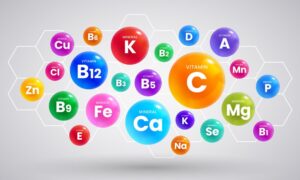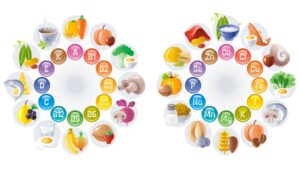The Role of Vitamins and Minerals in the Daily Diet
Contents
- 1 The Role of Vitamins and Minerals in the Daily Diet
- 2 Essential Vitamins and Their Benefits
- 2.1 Vitamin A: Supporting Vision and Immunity
- 2.2 Vitamin B Complex: Energy and Metabolism
- 2.3 Vitamin C: Immune Support and Skin Health
- 2.4 Vitamin D: Bone Health and Immune Function
- 2.5 Vitamin E: Antioxidant and Skin Health
- 2.6 Vitamin K: Blood Clotting and Bone Health
- 2.7 The Benefits of Exercise for Weight Loss You Need to Know
- 2.8 Elevate Your Weight Loss Journey with Proven Exercise Techniques
- 3 Essential Minerals and Their Benefits
- 4 The Synergistic Effect of Vitamins and Minerals
- 5 Practical Tips for Incorporating Vitamins and Minerals into Your Diet
The Role of Vitamins and Minerals in the Daily Diet
A well-balanced diet is fundamental to maintaining optimal health and well-being. One of the critical aspects of such a diet is the inclusion of vitamins and minerals. These essential nutrients play a vital role in various bodily functions, from supporting the immune system to promoting healthy skin and bones. In this comprehensive article, we will explore the significant roles of different vitamins and minerals, their sources, and the benefits they bring to our daily diet.

Essential Vitamins and Their Benefits
Vitamin A: Supporting Vision and Immunity
Vitamin A is crucial for maintaining healthy vision, promoting proper cell growth, and supporting immune function. It helps form and maintain healthy teeth, skeletal and soft tissue, mucous membranes, and skin. Vitamin A is also an antioxidant, which means it helps neutralize harmful free radicals in the body.
Sources of Vitamin A:
Carrots
Sweet potatoes
Spinach
Kale
Liver
Dairy products
Vitamin B Complex: Energy and Metabolism
The Vitamin B complex includes eight essential vitamins that play a vital role in energy production and metabolic processes. These vitamins include B1 (thiamine), B2 (riboflavin), B3 (niacin), B5 (pantothenic acid), B6 (pyridoxine), B7 (biotin), B9 (folate), and B12 (cobalamin). Each of these vitamins has specific functions but collectively, they help convert food into energy, support brain function, and promote healthy cell growth.
Sources of Vitamin B Complex:
Whole grains
Meat and poultry
Eggs
Dairy products
Legumes
Seeds and nuts
Dark leafy greens
Vitamin C: Immune Support and Skin Health
Vitamin C is essential for the growth and repair of tissues in the body. It is involved in collagen production, which is crucial for the skin, cartilage, tendons, ligaments, and blood vessels. Vitamin C also helps heal wounds and maintain healthy bones and teeth. As an antioxidant, it helps protect cells from damage caused by free radicals.
Sources of Vitamin C:
Citrus fruits (oranges, lemons, grapefruits)
Strawberries
Bell peppers
Broccoli
Brussels sprouts
Kiwi
Vitamin D: Bone Health and Immune Function
Vitamin D is vital for maintaining healthy bones and teeth by promoting calcium absorption in the gut. It also plays a role in immune system function, helping the body resist certain diseases. Adequate Vitamin D levels are essential for overall health and well-being.
Sources of Vitamin D:
Sunlight exposure
Fatty fish (salmon, mackerel, sardines)
Fortified dairy products
Egg yolks
Mushrooms
Vitamin E: Antioxidant and Skin Health
Vitamin E is a powerful antioxidant that helps protect cells from damage caused by free radicals. It is essential for immune function, skin health, and cellular communication. Vitamin E also plays a role in preventing blood clots by widening blood vessels and preventing platelets from clumping together.
Sources of Vitamin E:
Nuts and seeds (almonds, sunflower seeds)
Spinach
Broccoli
Vegetable oils (sunflower, safflower, wheat germ)
Fortified cereals
Vitamin K: Blood Clotting and Bone Health
Vitamin K is essential for blood clotting, which prevents excessive bleeding. It also plays a crucial role in bone health by helping the body use calcium effectively. Vitamin K is necessary for the synthesis of proteins involved in blood clotting and bone metabolism.
Sources of Vitamin K:
Leafy green vegetables (kale, spinach, broccoli)
Brussels sprouts
Fish
Meat
Eggs
The Benefits of Exercise for Weight Loss You Need to Know
Elevate Your Weight Loss Journey with Proven Exercise Techniques
Essential Minerals and Their Benefits
Calcium: Bone and Teeth Health
Calcium is the most abundant mineral in the body, essential for the development and maintenance of strong bones and teeth. It also plays a crucial role in muscle function, nerve signaling, and blood clotting. Adequate calcium intake is vital for preventing bone-related disorders such as osteoporosis.
Sources of Calcium:
Dairy products (milk, cheese, yogurt)
Leafy green vegetables (broccoli, kale)
Fortified plant-based milk (almond, soy, rice)
Tofu
Sardines and salmon with bones
Iron: Oxygen Transport and Energy Levels
Iron is a vital mineral that is necessary for the production of hemoglobin, a protein in red blood cells that carries oxygen from the lungs to the rest of the body. Iron is also essential for maintaining healthy skin, hair, and nails. Iron deficiency can lead to anemia, characterized by fatigue and weakness.
Sources of Iron:
Red meat
Poultry
Fish
Beans and lentils
Spinach
Fortified cereals
Magnesium: Muscle and Nerve Function
Magnesium is involved in over 300 biochemical reactions in the body. It is essential for muscle and nerve function, blood glucose control, and bone health. Magnesium also plays a role in energy production and supports a healthy immune system.
Sources of Magnesium:
Nuts and seeds (almonds, cashews, pumpkin seeds)
Whole grains
Legumes
Leafy green vegetables (spinach, kale)
Avocados
Dark chocolate
Potassium: Fluid Balance and Heart Health
Potassium is a key mineral that helps maintain fluid balance, supports proper muscle and nerve function, and promotes healthy blood pressure levels. It is also essential for heart health, helping to regulate heartbeats and reduce the risk of stroke.
Sources of Potassium:
Bananas
Oranges
Potatoes
Spinach
Beans and lentils
Fish (salmon, cod)
Zinc: Immune Function and Wound Healing
Zinc is crucial for immune function, wound healing, DNA synthesis, and cell division. It also supports normal growth and development during pregnancy, childhood, and adolescence. Zinc deficiency can lead to weakened immune response and delayed wound healing.
Sources of Zinc:
Meat and poultry
Shellfish
Beans and legumes
Nuts and seeds
Whole grains
Dairy products
The Synergistic Effect of Vitamins and Minerals
Vitamins and minerals often work together synergistically, enhancing each other’s absorption and effectiveness. For example, Vitamin D enhances calcium absorption, while Vitamin C increases iron absorption from plant-based sources. A well-rounded diet that includes a variety of nutrient-dense foods ensures that these essential nutrients work together to support overall health.

Practical Tips for Incorporating Vitamins and Minerals into Your Diet
Diversify Your Diet
Incorporating a wide range of foods in your diet ensures you get a balanced intake of vitamins and minerals. Aim to include a variety of fruits, vegetables, whole grains, lean proteins, and healthy fats in your meals.
Opt for Whole Foods
Whole foods are often richer in vitamins and minerals compared to processed foods. Choose fresh fruits and vegetables, whole grains, and lean proteins over processed snacks and meals.
Pay Attention to Food Preparation
How you prepare your food can affect its nutrient content. For example, steaming vegetables instead of boiling them can help retain more vitamins. Additionally, pairing certain foods together can enhance nutrient absorption, such as consuming iron-rich foods with vitamin C-rich foods.
Consider Supplementation
While a balanced diet should provide most of the nutrients you need, certain individuals may require supplements. This can include pregnant women, older adults, or those with specific dietary restrictions. Consult with a healthcare provider to determine if supplementation is necessary for you.
Stay Hydrated
Proper hydration is essential for overall health and helps the body absorb and utilize vitamins and minerals effectively. Aim to drink plenty of water throughout the day and include hydrating foods like fruits and vegetables in your diet.
Incorporating a variety of vitamins and minerals into your daily diet is essential for maintaining overall health and well-being. These nutrients play critical roles in supporting bodily functions, preventing chronic diseases, and promoting optimal physical and mental performance. By focusing on a balanced diet rich in whole foods and paying attention to nutrient interactions, you can ensure that your body gets the essential vitamins and minerals it needs to thrive. Remember, a well-rounded approach to nutrition is the foundation for a healthy and vibrant life.

